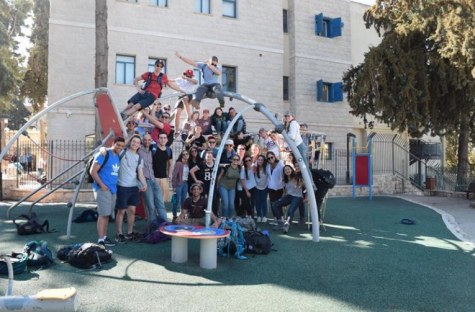Breaking the rules
Causes and consequences of misbehavior on Israel trip
June 1, 2016

Students in the Class of 2016 climb on playground equipment in Tzfat during their capstone Israel trip.
With their diplomas in hand, seniors may feel that a heavy weight has been lifted off of their shoulders. There are no classes to attend, homework assignments to complete or school rules to follow. But with this new freedom comes new responsibilities. In recent years, some CESJDS students have abused this freedom on their senior class trip in Israel.
The Alexander Muss High School in Israel (AMHSI) program houses JDS’ most recent alumni in Hod HaSharon on their three-month trip to Israel each spring. Because AMHSI organizes the trip and has legal responsibility for all participants during their time in Israel and Europe, the participants cannot completely act on their own terms and must follow AMHSI’s policies.
Prior to attending the program, participants’ parents are required to sign a contract stating that participants will adhere to the rules of the program and the AMHSI Code of Conduct. The Code states that “students are expected to behave, at all times, in a manner appropriate to their status as students at the AMHSI and guests of Israel. They are expected to abide by all policies of AMHSI as may be outlined in this and/or other documents or as necessarily established by AMHSI’s school administration.”
Coordinator of the Senior Capstone Trips and English teacher Nancy Wassner reminds students of the consequences of breaking the rules prior to their departure.
“I certainly warn participants about it every single year,” Wassner said. “What I say is ‘[your parents] are going to sign an agreement that says you’re going to stick to the rules. If you don’t stick to the rules, I can’t help you. There’s nothing I can do for you.’”
In the past, there have been several incidents in which JDS alumni have been sent home from the Israel trip. A participant was once sent home for mooning, and in 2006 there was a drug incident in which three participants were arrested and six others were expelled from AMHSI. This year, three members of the Class of 2016 were sent home for drinking alcohol on AMHSI’s campus.
Dean of Students and Interim High School Principal Roz Landy sees the misbehavior on the Israel trip as an example of risky behavior that is common among adolescents who believe that they are invincible. Wassner agrees, and points out two other reasons she believes JDS’ most recent alumni felt entitled to drink on their senior trip. Firstly, JDS is the only school whose participants in AMHSI’s program are official graduates of their high school, allowing them to “feel a little more free and a little more college-like.” Secondly, many JDS students are 18 years old on their trip, which is Israel’s legal drinking age.
Knowing that students do misbehave, AMHSI has specific procedures in place to confront these issues. When students come back from free weekends, and any other time that AMHSI deems it necessary, counselors use Breathalyzers to make sure that there is no alcohol in any participant’s system.
In addition to consequences for drinking, AMHSI punishes students for sexual activity, drug use, bullying, cyberbullying and other illicit behavior. According to the Code of Conduct, consequences range from “social prohibition,” where parents get a notification about their student’s misbehavior and students may get temporarily grounded by their counselors, to expulsion from the program.
Alumna Elianna Bernstein (‘16) attended the Israel trip with her grade this year, and believes that even with AMHSI’s punishment, participants disobeying the rules of the Israel trip is inevitable. Bernstein recognizes that as teenagers, she and her classmates are bound to make mistakes.
“I don’t think that the kids are bad or anything because they got sent home or the circumstances of what they did,” Bernstein said. “People just make mistakes. No one is perfect; people just happen to make mistakes.”
Bernstein does not believe that there is a way to resolve the misbehavior on the trip, and therefore thinks that instituting additional rules would be ineffective. She believes that the Israel trip is an opportunity for participants to come into their own, and that stricter rules would take away from this experience.
“We’re all 18 now, we are all going to college, and I would feel like they are just babying us,” Bernstein said.
According to Bernstein, the dismissal of three participants from the trip served as a “wake-up call” for her grade and made participants more wary of their actions. Participants understood that they would not want to do anything to jeopardize their experience in Israel.
Wassner believes that the participants’ actions also affect current JDS students.
“I can say that having worked in other Israel programs, these things go in cycles,” Wassner said. “Every few years, participants will break the rules and will get sent home, and then for a few years later everyone remembers ‘Oh that happened,’ and it’s a deterrent. And then eventually a few years later people forget, and do it again, and then it becomes a deterrent for the next several years.”

